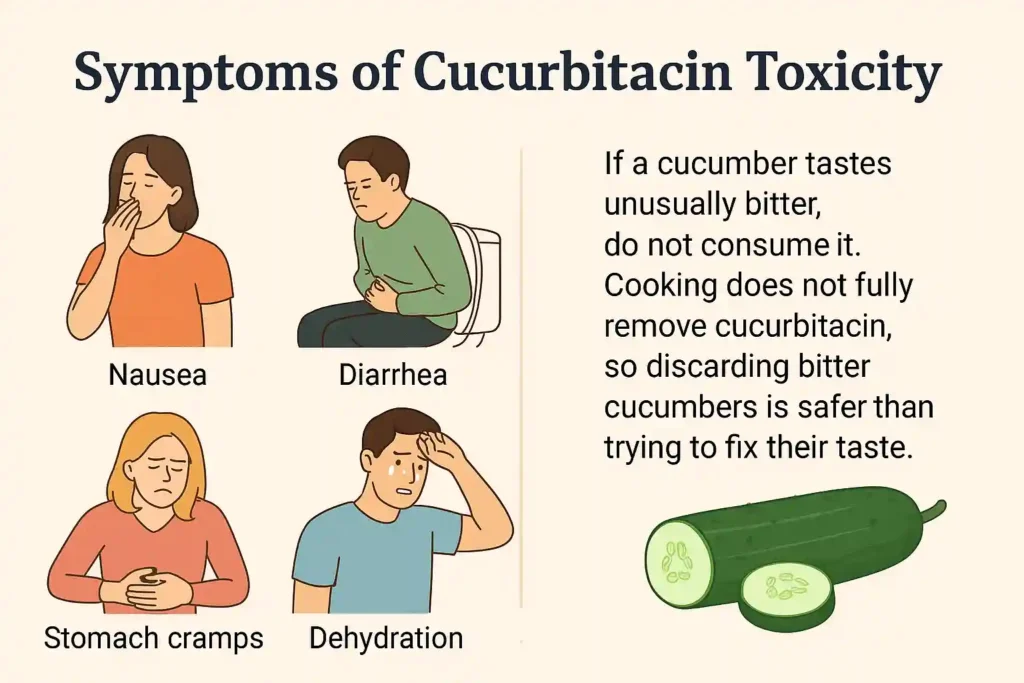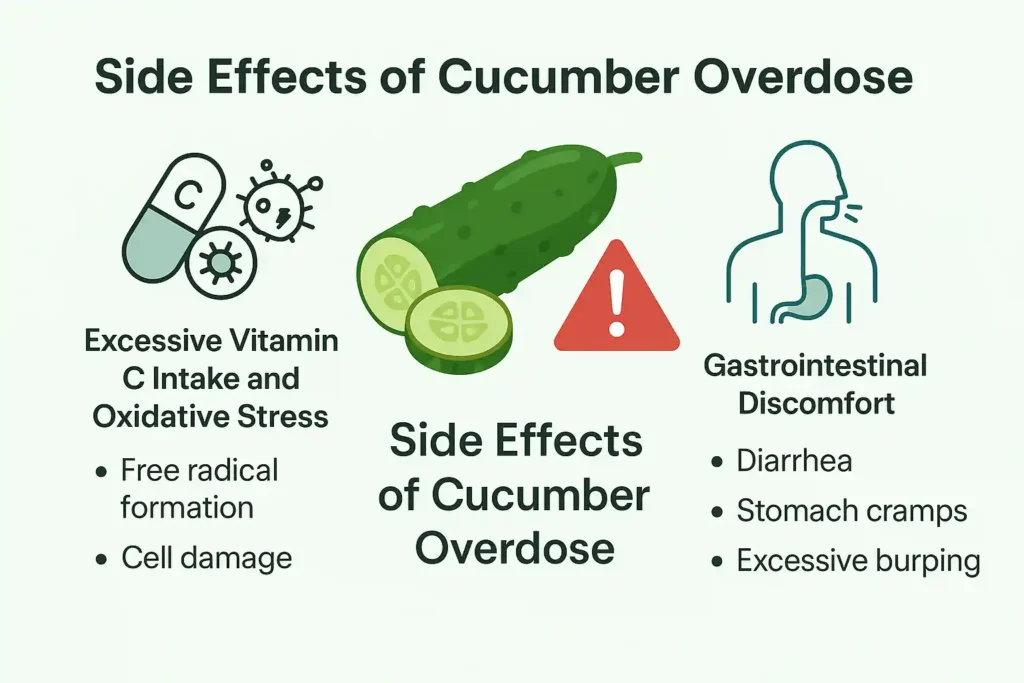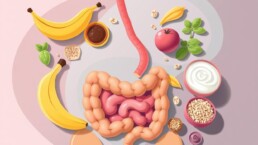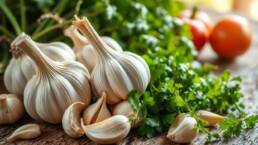Introduction to Cucumber Benefits and Risks
Cucumber side effects are often ignored because most people believe cucumbers are only healthy. While cucumbers are rich in water and fiber, eating too many may cause unexpected health problems.
Table of Contents
ToggleThe benefits and side effects of cucumber depend on how much you eat and how your body reacts. Moderate intake improves hydration, supports skin health, and promotes digestion. But cucumber overdose can harm kidneys, worsen sinus problems, and upset digestion.
Cucumbers: A Nutritious Addition to Your Diet
Cucumbers contain about 95 percent water, making them excellent for hydration. They provide vitamin K for bone health, vitamin C for immunity, potassium for heart function, and magnesium for nerve balance.
Nutritionists call cucumbers “negative calorie foods” because they contain very few calories yet require energy to digest. This is why people add them to weight loss diets.
Cucumbers are also classified as cooling foods and stomach upset remedies in traditional practices like Ayurveda. They are believed to reduce internal heat, which explains their frequent use in summer diets and skincare remedies.
Potential Concerns with Excessive Cucumber Consumption
Overeating cucumbers is not harmless. The risks come from their high water content, bitter compounds, and possible allergens. For people with kidney or sinus issues, cucumbers may cause more harm than good.
Toxicity from Cucurbitacins
What Are Cucurbitacins?
Cucumbers naturally contain a bitter compound called cucurbitacin. Commercial cucumbers usually have very low amounts because they are bred to be mild. However, wild cucumbers or bitter-tasting ones can have higher cucurbitacin levels.
Symptoms of Cucurbitacin Toxicity

Toxic reactions include nausea, diarrhea, stomach cramps, and dehydration. In rare outbreaks reported in Europe, people suffered severe gastrointestinal illness after eating bitter cucumbers high in cucurbitacin.
If a cucumber tastes unusually bitter, do not consume it. Cooking does not fully remove cucurbitacin, so discarding bitter cucumbers is safer than trying to fix their taste.
Excessive Fluid Loss and Dehydration
The Diuretic Properties of Cucumis sativus Seeds
Cucumber seeds act as mild diuretics. Eating too many cucumbers makes the body produce more urine. This leads to loss of water and electrolytes. Ironically, while cucumbers hydrate, an excess may dehydrate.
For athletes or people in hot climates, this may cause weakness or dizziness. Patients with kidney disease or those on diuretic medication should avoid eating cucumbers in uncontrolled amounts.
Digestive Issues from Cucumbers
Bloating and Flatulence
Many people notice gas or bloating after eating cucumbers. This is because cucumbers contain compounds that release gas during digestion. They are also grouped under watery vegetables and bloating triggers.
If you eat cucumbers at night or mix them with heavy meals like lentils or meat, gas production increases, leading to burping and discomfort.
Indigestion from Overeating
Cucumbers contain insoluble fiber. Moderate amounts support bowel health. But in excess, fiber slows digestion, causes fullness, and increases stool volume. This leads to digestive discomfort from cucumber in sensitive individuals.
Allergic Reactions to Cucumber
Oral and Skin Allergy
Some people experience itching in the mouth, lips, or throat after eating cucumbers. This is called oral allergy syndrome. Others develop a cucumber allergy rash or hives.
Applying cucumber slices directly to skin can sometimes cause cucumber skin irritation. While this is rare, it is possible in people with sensitive skin or underlying eczema.
Ragweed Pollen and Cross-Reactive Allergies
Cucumber allergies are linked with ragweed pollen. People allergic to ragweed often react to cucumbers because their proteins are similar. If you wonder what ragweed pollen is, it is a common allergen released by a weed that grows in late summer.
Symptoms include sneezing, itchy eyes, and throat irritation. During ragweed season, eating cucumbers may worsen these allergy problems.
Kidney and Electrolyte Concerns
Impact on Renal Function
Cucumbers are rich in water and potassium. Healthy kidneys filter this excess easily. But in people with kidney impairment, excess intake may stress kidney function and increase fluid retention.
Risk of Hyperkalemia (High Potassium)
Large amounts of cucumbers can lead to hyperkalemia. This condition occurs when potassium levels rise too high in the blood. It may cause irregular heartbeat, fatigue, or muscle cramps.
People with kidney disease or those on potassium-sparing drugs should avoid nutrient imbalance from cucumber overdose.
Side Effects of Cucumber Overdose

Excessive Vitamin C Intake and Oxidative Stress
Cucumbers contain vitamin C. While moderate intake supports immunity, too much vitamin C may trigger free radical formation. This leads to oxidative stress that damages cells instead of protecting them.
Gastrointestinal Discomfort
Cucumbers are light but overeating them may trigger diarrhea, stomach cramps, and excessive burping. The cucumber fiber effects can turn negative when eaten in large amounts, especially for people with sensitive digestive systems.
Cardiovascular Implications of Water Overload
Too much cucumber means too much water intake. This dilutes sodium in the body and lowers blood sodium levels, a condition called hyponatremia. Symptoms include dizziness, nausea, and irregular heartbeat.
People with heart problems must be careful about excessive water content in cucumber, since low sodium may worsen cardiovascular instability.
Respiratory Effects of Cucumber
Can Cucumber Aggravate Sinusitis
Traditional healers often warn against cucumbers for people with sinus problems. Being naturally cooling, cucumbers can increase mucus production and worsen sinusitis symptoms.
Sinusitis Symptoms to Watch Out For
Pay attention to sinusitis symptoms such as nasal congestion, headaches, facial pain, and watery discharge. If these become worse after cucumber intake, reducing cucumber consumption is advisable.
Pregnancy Considerations
Frequent Urination and Discomfort
Pregnant women already urinate frequently due to pressure on the bladder. Eating many cucumbers may worsen this problem because of their diuretic effect. This can disturb sleep and daily comfort.
Safe Cucumber Intake During Pregnancy
Pregnant women should eat cucumbers in moderation. One or two cucumbers a day are generally safe. Eating too many can cause bloating, excess urination, and cooling foods and stomach upset.
Final Thoughts: Balancing Benefits and Side Effects of Cucumber
Cucumbers are healthy snacks, rich in vitamins and water. But cucumber overdose may lead to bloating, kidney stress, and allergic reactions. Balance is key.
Enjoy cucumbers in moderation, avoid bitter ones, and listen to your body. The cucumber toxicity myth vs fact is simple: cucumbers are not dangerous unless eaten excessively or in bitter form.
FAQs
What are the side effects of eating too much cucumber?
Too many cucumbers can cause bloating, dehydration, diarrhea, and kidney strain. They may also trigger allergies, skin irritation, and worsen sinus problems in sensitive people.
What happens if you have too many cucumbers?
Excess cucumbers overload the body with water and potassium. This may lead to low sodium, irregular heartbeat, and digestive distress. Sensitive individuals may also develop allergic reactions.
How many cucumbers per day is safe?
Most healthy people can safely eat one to two medium cucumbers daily. Eating more may cause indigestion, kidney strain, or increase the risk of bloating and water imbalance.
What should not be mixed with cucumber?
Avoid combining cucumbers with milk or heavy protein meals. These combinations may slow digestion and increase gas formation, making bloating and discomfort more likely to occur.
How much time does cucumber take to digest?
Cucumbers digest in about one to two hours. However, if combined with heavy meals, digestion takes longer, and this may lead to gas formation or bloating in sensitive individuals.
Why must you not eat raw cucumber with meals?
Eating raw cucumbers with heavy meals may cause slow digestion. Their water and fiber content may dilute stomach acid and reduce the efficiency of digestion, leading to bloating.
When not to eat a cucumber?
Avoid eating cucumbers at night, during sinus flare-ups, or if you are experiencing diarrhea. People with kidney problems should also restrict excess intake of cucumbers.

This article is medically reviewed by Dr. Nivedita Pandey, Senior Gastroenterologist and Hepatologist, ensuring accurate and reliable health information.
Dr. Nivedita Pandey is a U.S.-trained gastroenterologist specializing in pre and post-liver transplant care, as well as managing chronic gastrointestinal disorders. Known for her compassionate and patient-centered approach, Dr. Pandey is dedicated to delivering the highest quality of care to each patient.








